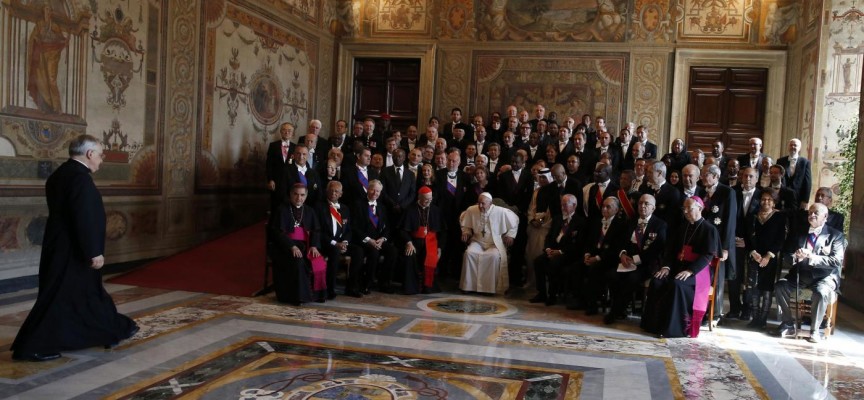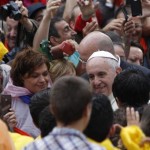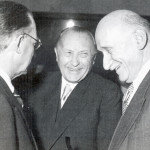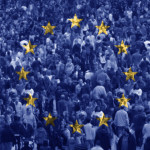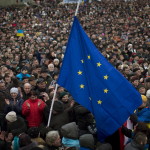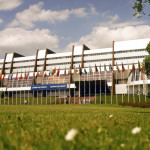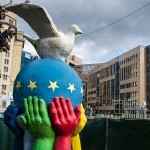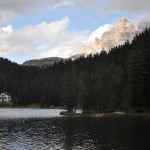Pope Francis does not hide his difficulty in understanding the European Union. Yet, his exhortation Evangelii gaudium may be useful in undertaking the building of Europe.
He said it himself: he comes from “the end of the world”, not from Europe. Jorge Bergoglio is now the bishop of Rome. As his name suggests, his family originates from Piedmont. But Bergoglio is Argentine, indeed of Buenos Aires, his hometown. His way to greet the young, with the thumb upwards, reveals his “American” side. Francis is also the first pope who comes from the South of the world, the one who puts an end to ‘Eurocentrism’, as his spokesman, Father Lombardi, summed up at the end of the first six months of his pontificate.
In fact, Bergoglio never speaks of Europe as such. He never mentioned it in his greetings to the diplomatic corps on January 13th, as he did for other regions of the world. No journey there is expected yet, while he travelled to the Middle East in May, then in Asia, and Brazil last year. The editor of the daily newspaper “Corriere della Sera,” Ferruccio de Bortoli, in his interview with the Pope in March, asked him why he never speaks of Europe: differently, it is clear, from his predecessors, particularly John Paul II and Benedict XVI. Francis replied that he had not spoken specifically of Asia or Africa, and that there had not still been “any opportunity to speak about Europe yet”. “It’ll come,” he concluded elusively.
Interviewed on his return from the Holy Land, the day after the European elections, about the advancing of populism in our continent, Bergoglio did not hide his ignorance on the subject: “Europe, trust or distrust. And then the euro, some who want to go back…. I do not understand much of this. “
A passage of the Evangelli Gaudium, a very personal exhortation of Pope Francis, however, can enlighten us about the crisis that the construction of Europe is undergoing. There are four principles which the Pope proposes to “progress in building a people in peace, justice and fraternity (…) where differences are harmonized within a shared pursuit “ (221). No indication of Europe, of course, but these principles can be applied to our continent.
Especially striking is the title: “Unity prevails over conflict”, transformed into the ring junction of a new peace process. This principle is the basis of the community building designed by Robert Schuman and the other founding fathers of Europe. However, the other principles suggested by the Pope are relevant too. “Time is greater than space.” The title is abstract but valuable to learn not to get impatient in front of the slowness of Europe.
As well as in its own particular way of governing the Church, Pope Francis opposes the immediate taking of possession of the seats of power to the beginning of processes that flourish in time.
In this perspective, to make Europe means to enter a long process of regaining ourselves before undertaking and having to deal with new levels of competence.
Another principle, “Realities are more important than ideas.” “We have politicians who wonder why people do not understand and follow them, since their proposals are so clear and logical,” says Bergoglio in his exhortation. The fervent of united Europe share the same question in front of the prevailing Euroscepticism, so the integration project seems more relevant than ever. Reconciling the idea of Europe with reality, not letting the idea move away but to establish an ongoing dialogue between the two, as recommended by the exhortation, would avoid misunderstandings and disappointments, which feed the present distrust in the European project.
Last principle, “the whole is greater than the part.” We constantly have to broaden our horizons and see the greater good which will benefit us all. But this has to be done without evasion or uprooting”, writes Francis. A sentence that could be affixed in the Council Chamber of the European Union for the meetings of the 28, in the hemicycle of the new Parliament, or in Berlaymont, the hall of the College of the future Commissioners.
Le pape François ne cache pas ne pas bien comprendre l’Union européenne. Mais son exhortation Evangelii gaudium peut très bien servir d’approche à la construction européenne.
Il l’a annoncé lui-même, il vient “du bout du monde”, pas d’Europe. Jorge Bergoglio est aujourd’hui l’évêque de Rome. Sa famille, comme son nom le trahit, est originaire du Piémont. Mais il est Argentin et même d’abord Buenos Aires, sa ville natale. Sa façon de saluer les jeunes le pouce levé montre son côté américain. Il est aussi le premier pape du Sud. Celui qui met fin à “l’euro-centrisme”, comme l’avait résumé son actuel porte-parole, P. Lombardi, au bout de six mois de pontificat.
L’Europe, de fait, il n’en parle jamais en tant que tel. Il ne l’a pas évoquée dans ses vœux au corps diplomatique le 13 janvier dernier, à la différence d’autres régions du monde. Il n’y prévoit aucun voyage pour l’heure, à la différence du Proche-Orient en mai dernier et de l’Asie ensuite ou du Brésil précédemment. Le directeur du Corriere della Sera, dans son interview du pape en mars dernier, lui a même demandé pourquoi il ne parlait jamais d’Europe. Sous-entendu à la différence de ses prédécesseurs, en particulier de Jean-Paul II et de Benoît XVI. Jorge Bergoglio a répondu qu’il n’avait pas davantage traité de l’Afrique ou de l’Asie et qu’il n’avait pas eu “encore l’occasion de parler d’Europe”. “On verra”, concluait-il évasivement.
Interrogé à son retour de Terre sainte, au lendemain des élections européennes, sur la montée du populisme sur notre continent, il n’a pas caché son ignorance du sujet européen: “L’Europe, la confiance ou la méfiance dans l’Europe. Egalement l’euro, certains veulent retourner en arrière.. Je ne comprends pas bien toutes ces choses”.
Un passage d’Evangelii gaudium, exhortation très personnelle du pape François, peut toutefois nous éclairer face à la crise que connaît la construction européenne. Il s’agit des quatre principes que le pape avance pour “avancer dans cette construction d’un peuple en paix, juste et fraternel (..) où les différences s’harmonisent dans un projet commun” (n°221). Bien entendu, il ne mentionne pas l’Europe mais ces principes peuvent s’y appliquer.
C’est particulièrement frappant pour l’énoncé: “L’unité prévaut sur le conflit”, celui-ci étant transformé en maillon d’un nouveau processus de paix. Ce principe est à la base de la construction communautaire lancée par Robert Schuman avec les autres pères fondateurs de l’Europe.
Mais les autres principes bergogliens se révèlent aussi pertinents. “Le temps est supérieur à l’espace”. L’énoncé est abstrait mais il est précieux à comprendre pour ne pas s’impatienter devant les lenteurs de l’Europe à petits pas. Comme dans sa propre manière de gouverner l’Eglise (hyperlien), le pape François oppose l’occupation immédiate d’espaces de pouvoirs à l’initiation de processus s’épanouissant dans le temps. Dans cette perspective, faire l’Europe est devrait nous inscrire dans un long processus de reconquête de nous-mêmes avant de se résumer à un nouvel échelon de compétence à contrôler.
Autre principe, “la réalité est plus importante que l’idée”. “Il y a des hommes politiques qui se demandent pourquoi le peuple ne les suit alors que leurs propositions sont si logiques et si claires”, observe l’auteur d’Evangelii gaudium. Les fervents de l’Europe unie partagent la même interrogation face à l’euroscepticisme rampant tant le projet d’intégration paraît plus que jamais pertinent. Réconcilier l’idée d’Europe avec la réalité, ne pas laisser l’idée s’en séparer mais établir un dialogue permanent entre les deux, comme le conseille l’exhortation, éviterait malentendus et déceptions, qui nourrissent tant la défiance actuelle à l’égard du projet européen.
Dernier principe, “le tout est supérieur à la partie”. “Il faut toujours élargir le regard pour reconnaître un bien plus grand qui sera bénéfique à tous. Mais il convient de le faire sans s’évader, sans se déraciner”, écrit le pape François. Une citation qui pourrait être placée dans la salle du Conseil de l’Union européenne pour les négociations à 28, dans l’hémicycle du nouveau Parlement européen ou, au Berlaymont, dans la salle du collège des futurs commissaires.
Francesco: un papa non europeo, eppure…
Papa Francesco non nasconde la sua difficoltà nel comprendere l’Unione europea. Eppure la sua esortazione Evangelii gaudium può essere utile nell’intraprendere la costruzione europea.
Lo ha detto lui stesso: viene “dalla fine del mondo”, non dall’Europa. Jorge Bergoglio è oggi il vescovo di Roma. Come il suo cognome suggerisce, la sua famiglia è originaria del Piemonte. Ma Bergoglio è argentino, anzi, di Buenos Aires, sua città natale. Il suo modo di salutare i giovani, col pollice in sù, rivela il suo lato “americano”. Francesco è inoltre il primo papa che viene dal Sud del mondo, colui che mette fine all’“eurocentrismo”, come aveva sintetizzato il suo portavoce, p. Lombardi, alla fine dei primi sei mesi di pontificato.
Di fatto, Bergoglio non parla mai dell’Europa in quanto tale. Non l’ha mai citata nei suoi saluti al corpo diplomatico lo scorso 13 gennaio, come ha fatto per altre regioni del mondo. Nessun viaggio vi è ancora previsto, mentre si è recato in Medio Oriente a maggio, poi in Asia, e in Brasile lo scorso anno. Il direttore del “Corriere della sera”, Ferruccio de Bortoli, nella sua intervista a Bergoglio, a marzo, ha chiesto al papa perché non parla mai dell’Europa: a differenza – è sottinteso – dei suoi predecessori, in particolare di Giovanni Paolo II e di Benedetto XVI. Francesco ha risposto di non aver parlato specificatamente né dell’Asia né dell’Africa, e che non c’era stata “ancora l’occasione di parlare d’Europa”. “Verrà”, ha concluso elusivo.
Intervistato al suo ritorno dalla Terra Santa, all’indomani delle elezioni europee, a proposito dell’avanzare del populismo nel nostro continente, Bergoglio non ha nascosto la sua ignoranza sull’argomento: “L’Europa, la fiducia o la sfiducia. E poi l’euro, alcuni che vogliono tornare indietro… di questo io non capisco tanto”.
Un passaggio dell’Evangelli Gaudium, esortazione molto personale di papa Francesco, può tuttavia illuminarci sulla crisi che sta conoscendo la costruzione europea. Si tratta di quattro principi che il papa propone per “avanzare in questa costruzione di un popolo in pace, giustizia e fraternità (…) in cui le differenze si armonizzino all’interno di un progetto comune” (221). Non nomina l’Europa, ben inteso, ma questi principi si possono applicare al nostro continente.
Colpisce in particolare il titolo: “L’unità prevale sul conflitto”, trasformato nell’anello di congiunzione di un nuovo processo di pace. Questo principio è alla base della costruzione comunitaria pensata da Robert Schuman e dagli altri padri fondatori dell’Europa. Ma anche gli altri principi suggeriti da Bergoglio si rivelano pertinenti. “Il tempo è superiore allo spazio”. Il titolo è astratto ma prezioso per imparare a non spazientirsi di fronte alla lentezza dell’Europa.
Cosi come nel suo modo particolare di governare la Chiesa, papa Francesco oppone all’immediata presa di possesso dei posti di potere, l’avvio di processi che fioriscano nel tempo.
In questa prospettiva, fare l’Europa significa iscriversi in un lungo processo di riconquista di noi stessi prima d’intraprendere e dover gestire nuovi livelli di competenza.
Altro principio, “la realtà è più importante dell’idea”. “Vi sono politici che si domandano perché il popolo non li comprende e non li segue, se le loro proposte sono così logiche e chiare”, osserva Bergoglio nell’esortazione. I ferventi dell’Europa unita condividono la stessa domanda di fronte all’euroscetticismo imperante, tanto il progetto d’integrazione appare più che mai pertinente. Riconciliare l’idea dell’Europa con la realtà, non lasciare che l’idea si allontani ma stabilire un dialogo continuo tra le due, come consiglia l’esortazione, eviterebbe malintesi e delusioni, che nutrono l’attuale sfiducia al progetto europeo.
Ultimo principio, “il tutto è superiore alla parte”. “Bisogna sempre allargare lo sguardo per riconoscere un bene più grande che porterà benefici a tutti noi. Però occorre farlo senza evadere, senza sradicamenti”, scrive Francesco. Una frase che potrebbe essere affissa nella sala del Consiglio dell’Unione europea per le riunioni dei 28, nell’emiciclo del nuovo Parlamento europeo, o a Berlaymont, nella sala del collegio dei futuri commissari.
Sebastien Maillard
Latest posts by Sebastien Maillard (see all)
- A Pope worried for the future of Europe - 27 novembre 2014
- Pope Francis begins with Albania - 21 giugno 2014
- Francis: a non-European pope, and yet… - 9 giugno 2014

